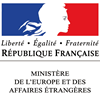The Diplomatic Archives: a French memory of the world

Treaties, Agreements, Correspondence, Maps... a unique heritage!
The notion of "Foreign Affairs" appeared at the end of the 16th century with the founding of a secretariat/department of state for these matters. A century later, in 1680, on the initiative of Charles Colbert de Croissy, an actual diplomatic archives service was set up, and over time it became one of the most important in the world. These autonomous archives tell the story of France through its links with foreign countries, and the history of the Ministry of Foreign Affairs. Their current mission includes a range of projects: the continuity of the Institution, the communication of documents to the public for research purposes, the organisation of colloquia and conferences. From the Louvre (residence of the kings of France until Louis XIV), to La Courneuve, the Diplomatic Archives have travelled widely.
Kept from 1863 to 2009 at the Quai d’Orsay and in a dozen other places, they are now in a new centre built on an industrial wasteland in La Courneuve, on the utskirts of Paris, based on Henri Gaudin’s architectural planning. This new centre has a 160-seat reading room where 500,000 works can be consulted. The entire collection is stored on 70 kilometres of shelves. The most important part of the collection is made up of documents of legal value, including the treaties and agreements that have marked the history of France since the 14th century, from the oldest dating from 1304 to the treaties establishing the European Union. In addition, there are files of correspondence from French embassies, consulates and legations -documents sometimes written at the very heart of historical events. Some of these bear the signatures of Stendhal, Chateaubriand, Paul Claudel and Romain Gary.
Donations from diplomats and their families, from private individuals and other purchases regularly enrich this unique heritage. These include the Napoleon papers, the Richelieu papers, the memoirs of Saint Simon... In addition, a collection of maps revealing the mobility of states, and less conventional forms of archives such as photographs, films and recordings, complete this collection.
We had the opportunity to go there and discover a small part of the treasures housed in the 70 kilometres of binders and files: manuscripts bearing the signatures of Napoleon, and of foreign sovereigns - in French-,military governors, spectacular and precious documents such as the election of the Duke of Anjou as King of Poland (1573), the Treaty of estphalia (1648), the Golden Letter of the King of Siam (1861), or the Elysée Treaty (1962) between France and Germany.
To the delight of our visitors, the curators also presented documents illustrating France’s relations with their respective countries. The current temporary exhibition "Diplomacy in War 1870-1871”, guided with passion,reminded us of the origins and consequences of this Franco-Prussian conflict, illustrated here by correspondence between the belligerent parties and... caricatures.
In the end, this trip to La Courneuve felt too short...

By Valentine Carré -Treasures of French Heritage
Archives diplomatiques 3, rue Suzanne Masson 93120 La Courneuveves


